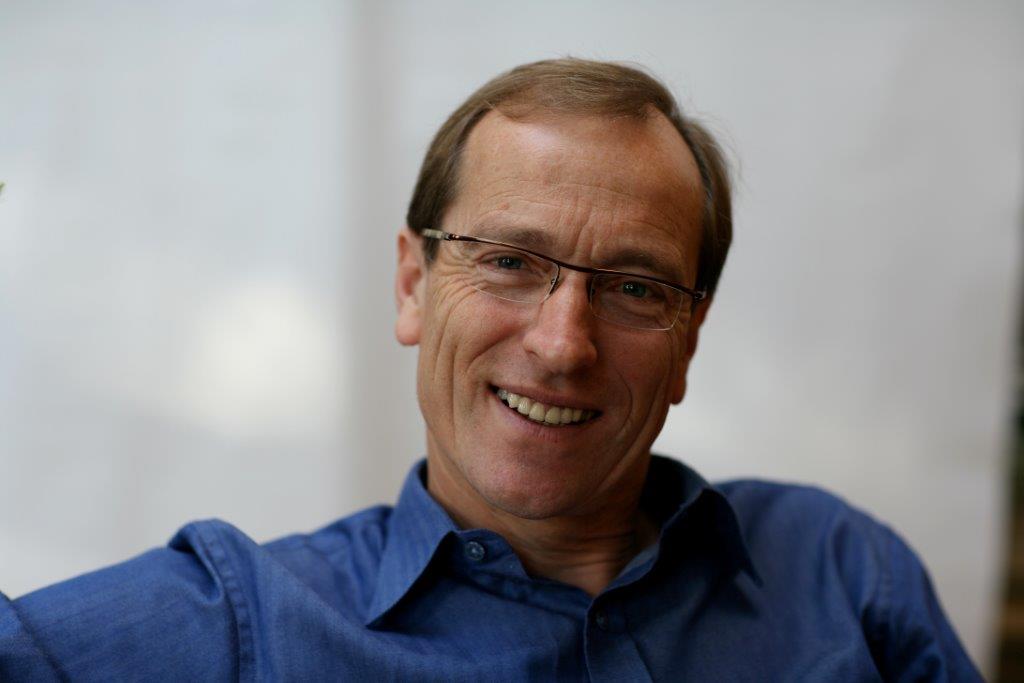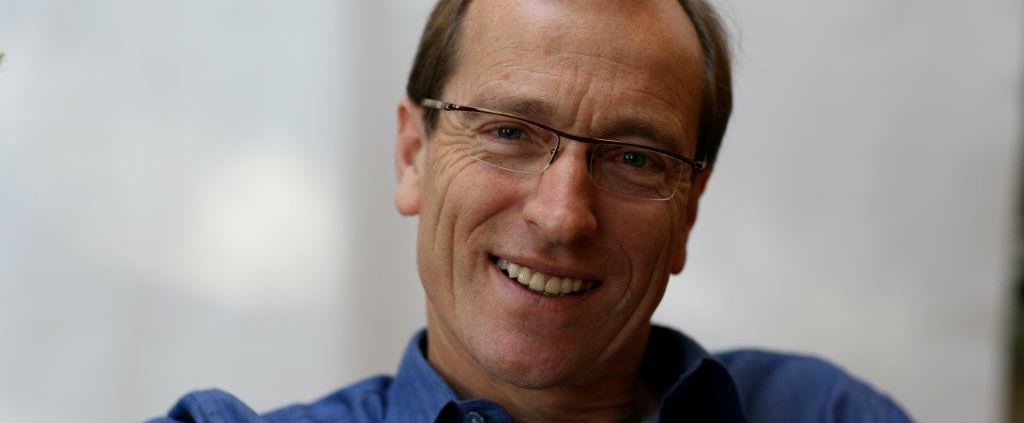Rediscovering the Human Purposes of Business, by Mark Goyder
Below is the text of a speech given by Mark Goyder, Founder and Director of Tomorrow’s Company, at the Caux Initiatives for Business Conference, Panchgani India, on 12 November 2013. Goyder sent me (Jon Haidt) the text of this speech when we were first introduced. I loved it. I thought Goyder expressed a vision of business that automatically inspires better ethics. When I found out that the speech is not available online, I asked Goyder for permission to post it at EthicalSystems. I hope it will be assigned in courses on leadership and on business ethics. I hope it will help visionary leaders of the sort Goyder describes to inspire their teams to press on. Here is the text, with only very light edits and annotations from me. I have put in boldface the most direct links to ethical systems design
 |
| Photo of Mark Goyder by Elizabeth Handy |
India, we are told, is at the crossroads. Its growth is slowing. Foreign investors are losing faith. It still hasn’t opened up its markets and liberalised its economy. The poor are still poor and economic justice is still far off. Corruption has not been defeated.
Perhaps there is truth these criticisms. And yet, if a country like India is truly to set itself on the path to lasting economic progress, many of us here today would probably agree that the answer to India’s problems does not lie solely in technical or technocratic solutions. Or even rockets to Mars!
The answers are to be found in the human spirit. In deeper wisdom which India has always nurtured. It has to do with the foundations we lay, in society, in business, and in our souls, and the habits that we develop. It means learning from the achievements of the best. And learning from the mistakes of the West.
It means creating the conditions in which people find it natural to work together for a purpose that goes beyond making money.
Last month I spent a week with my wife and family in Myanmar. While I was there I read Pascal Khoo Thwe’s book, From the Land of Green Ghosts, which starts with an account of his growing up as a member of a remote Burmese tribe. This is how he talks about the harvest.
We grew maize, sorghum for the domestic animals, groundnuts for oil, beans, yams, potatoes, cucumbers, pumpkins, melons, gourds, watermelons, chillies, and other vegetables in the paddy fields. But the most important crop was rice, which was not only a staple food, but was used to make the rice wine which we drank every day of our lives.
I loved the cold season best. It brought the rich fragrance of the rice and other crops as they ripened after the heavy rotting smell of the monsoon… The monsoon had its own special character of sound, the combination of the bird sounds, the rain, thunder and wind.
The harvest would start in late December with groundnuts, maize, beans and other crops. As it was the most important, the rice harvest was attended with much ceremony. Friends and relatives came to help with the reaping, threshing, winnowing, and storing of the with much ceremony.
Sowing, growing, reaping, threshing, winnowing, storing. I had never really thought of these separate activities. I just knew they amounted to something called the harvest. The passage struck me for several reasons.
First this was a living account of economic life. It described economic activity in the context of human relationships. The purpose of the economic activity was clear. And it showed a true understanding of the connectedness of the different tasks within the harvest. Sowing, growing, reaping, threshing, winnowing, storing.
You may think I am being sentimental. Harking back to a long lost and far-from– ideal rural existence.
Not at all. I am being much more demanding than that. I am saying we have to accept that our economic life is complicated, global, and highly specialised and YET STILL we must better understand the connectedness between the modern equivalents of sowing, growing, reaping, threshing, winnowing, storing.
Saving, investing, stewarding assets, managing funds, starting, growing and floating businesses, putting in place the right boards, appointing their leaders, stewarding those companies for today and tomorrow, ensuring they are properly accountable. The fact that we often lose sight of these connections is a downside of our undoubted economic progress; progress which we would not want to see stopped.
The religions of the world share many insights about the right way to live, and the best way to make sense of the world. One of these insights is this. Everything is connected. Body and soul, mind and spirit; present and future. So, if we know from the wisdom of old that everything is connected, why have we decided to ignore this in our economic life? When did we allow the criteria of financial and economic success to become disconnected from human purposes? And how do we reconnect the two?
That’s what my work for the past 20 years has been all about. And that’s what living Tomorrow’s Company is about.
Let me tell you a little about me. I am the youngest of 8 children. My father is no longer alive, but he was an inspiration to me. As a practising business manager and church leader he wrote and spoke and mobilised others to see business as being subordinate to society.
I then spent five years working for GEC (the General Electric Company), at the time one of the UK’s most successful engineering companies. After that I moved into paper manufacturing, and developed from a young HR manager into the general manager of a hardboard mill making equipment for the motor industry.
Before leaving the business world for that of the think tank I had spent 16 years in business and my roles had ranged from HR, industrial relations, health and safety, distribution, sales and marketing, quality, customers service, warehousing, and culture change.
With the help of many people, I was able ultimately to set up Tomorrow’s Company as an organization dedicated to challenging those who work in and around business. First in the UK, and later with business leaders around the world.
And here’s my challenge, with all humility, coming as I do from a part of the world which has created so much harm through its economic thinking. How do India and its neighbours in South East Asia chart a path to the future in which they avoid the mistakes of the West? How do we reconnect business with society; finance with wealth creation; money with nature? The answer, I suggest, starts with the way we think. That in turn influences the way we act in business, and the way investors act, and the rules and frameworks that are set by whole societies.
How we think
If we want to see the right ideas prosper in the marketplace, we first have to win the battle of ideas. There are five different yet linked key variables in the way people think about business. The assumptions people make under these five headings combine to form the “taken for granted” attitudes for business along a spectrum that runs from the exclusive to the inclusive.
1) Motivation – Money Or More?
The first is about what motivates human beings in business. The exclusive approach assumes that people are only motivated by money. By definition economic man is only interested in financial incentives, financial measures, and financial results.
To make any kind of generalisation in the economic laboratory, economists have to simplify and concentrate on those parts of economic behaviour that are predictable. This is very useful for, say, calculating the response of consumers to changes in the price. But tells us nothing about how people respond to leadership; how businesses generate loyalty because of their purpose and values – all factors which research tells us are central to enduring profitability.
2) Markets – master or servant?
The second question is about how far people trust markets to deliver the right answers. On the “exclusive” side in this battle of ideas stand those market disciples who believe that market mechanisms are supreme. On the “inclusive” side stand those who believe that markets are flawed human inventions–an important but not sacred moving part in a delicate system which needs constant adjustment . They believe in harnessing market forces to society’s priorities.
3) Business – Part of or apart from society?
The third question is about how people see the relationship between business and society. In the exclusive view business and society sit in separate compartments. In its mildest form this argument says that businesses, and those who run them or own them, do not need to worry about the needs of society while pursuing profits. The stronger form goes further: it is bad for business and for society if business “takes its eye of the ball” and thinks about the needs of society. The inclusive approach says with JRD Tata that what came from the people must go back to the people. It says that business is a servant of society.
4) Value – Scarce Or Abundant?
The fourth question is about how people in business see value. Do they think in terms of abundance or scarcity? Just as some people see motivation in financial terms, some people see value in purely financial terms. They see business value as a “zero-sum game”. Spend more on your workers’ wages or give more to charity or the arts and you will have less left for your shareholders.
Others see value as a positive sum game. Their philosophy is that the more you put in, the more you will get out. Put money back into the neighbourhoods where you operate; invest in people and in carbon reduction, and somehow it will come back to you. The inclusive approach sees the best companies creating value in ways that are a win-win for shareholders, staff and society. [editors’ note: See Adam Grant’s book Give and Take, on this point]
5) People – Whole Or In Part?
The fifth question is about how people think about shareholders and other stakeholders. Do they see shareholders, customers, suppliers, workers, and citizens as distinct and separate groups of people? Or do they see terms like “shareholder” and “stakeholder” as descriptions of particular roles that people may have be wearing in one particular situation?
To a social scientist or anthropologist, it is obvious that human beings all have multiple roles, and this of course helps to explain why most of them don’t isolate financial considerations from other aspects of human life. In the United States in 2012, there was a terrible multiple shooting of children in an elementary school in Newtown, Connecticut. In the aftermath, newspapers reported that Cerberus, the owners of the company whose gun was used in the shooting, was considering pulling out of its investment in that company. The reports also mentioned that the father of Cerberus’ CEO lived in the town where the shootings occurred. It would be hard to find a clearer example of the truth that no human being can entirely separate into different compartments the way that they live their life
The assumptions behind this exclusive approach have been spreading over my lifetime. Many of them can be found at the heart of the banking crisis. Their prevalence helps to explain the growing public mistrust of business.
We need an inclusive approach. The philosophical and spiritual values of Asia would seem to have much to say about human beings, about their purpose and relationships with each other, and about their relationship with the natural world, that is consistent with such an approach to business.
The western word “inclusive” will not resonate for everyone in the East. We may need to discover a better language. Yet whatever the labels, and whatever our cultural origins, business attitudes in East and West alike have the potential to move beyond the narrow reductionism of “homo economicus” and the exclusive focus on financial measurement to rediscover the human purposes of business.
How we Act
How we think then influences how we act. The practical agenda for an inclusive approach is really common sense, at least to those who accept that business is a human activity, conducted by human beings , in relationships with one another, using the mechanisms and disciplines of the market to help them achieve human purposes. In other words, business activity is impossible without making a profit, but moneymaking is rarely the sole purpose of business.
There is abundant evidence that businesses which over long periods of time seek to serve a purpose beyond profit outperform those who look for money alone. And it’s hardly surprising. We do business with those we trust. We are much more likely to do repeat business with those we trust. Getting a new customer is more expensive for a business that building a relationship with an existing customer. Regulation is going to punish businesses which prove untrustworthy. Trust enhances the value of the brand. The best people want to work for organisations that give their work meaning and purpose. beyond their financial return. [Editor’s note: See our research page on why Ethics Pays]
And so it is that all the best businesses start with purpose and values; they stay true to purpose and values in all relationships. They have a clear success model. Their communications are always a reflection of their purpose and values. Their ethics are founded on their purpose and values. Their CSR is not some leisure activity – it is simply their purpose and values in action, in all, their relationships. I’ve always called this the virtuous circle of governance.
It seems obvious. It has been true for centuries. Yet it has precious little too do with what is taught in our business schools, our management textbooks, let alone the world of corporate finance. For in all of these sources and places you will enter a parallel universe, where money is the measure of everything. Where CSR somehow has to be fitted in (and only if we have prepared something called a “business case”!)
How we own
Many people find these arguments convincing. But then they say “that’s all very well, but how do you persuade the shareholders to think like that?” That leads us to a different question. Who are the shareholders? Often they are presented like alien beings. “The markets,” we are told, think a certain way. If “the markets “ have formed a poor impression of a company’s latest announcement, then that company has had to change course in order to satisfy “market expectations”. Here again, we are in a parallel universe. In the real world of wealth creation. entrepreneurs start businesses; they go to the markets for capital to help them achieve human purposes.
I’ve never heard of an entrepreneur starting a business by saying, “I wonder if there are some shareholding institutions whom I have never met who might like to own some shares if I started a business!” The real world of wealth creation is different from the world measured by short term shareholder value. So, once a business has been started, and set out along the right lines, how is it sustained?
The answer lies in an approach to ownership. An approach which combines continuity and renewal; inner strength and outer strength. You only have to look at the history of Tata to see a living and enduring answers that question. This is a world of trusteeship. Of Jamsetji and JRD Tata. Of Linney group. It is a world in which owners wish to pass on the business in a healthier shape than they inherited it.
I used to say that stewardship or trusteeship was an anchor. It’s better described as a keel. It holds the company to a course, or helps those leading the business to hold to a course through different seas, from calm to choppy to turbulent. We need more of this kind of ownership. We need it for the stability and constancy of the business. But we also need it because of the part business plays in society.
Owners who give managers the confidence to manage without the arrogance or greed that puts themselves ahead of the organisation. Owners who look outwards. Owners who see the business as a servant of society. Owners who stimulate necessary change while holding on to constancy. We need such owners precisely because ordinary citizens have become disconnected from the world of business. That is very risky.
This brings us back to the harvest. Sowing, growing, reaping, threshing, winnowing, storing. We stored the seed; we sow the seed. We lead and grow the companies. We reap and thresh and winnow . We entrust much of this to intermediaries who we want to have that same close connection to us as the people in the harvest described by Pascal. Intermediaries thresh and winnow – and should be doing so without keeping too much for themselves!
And they shouldn’t be doing what one German described the Western stock markets as doing: demanding the harvest at Easter. We need to be able to smell the harvest of wealth creation in the same way that Pascal Khoo Thwe said he could smell “the rich fragrance of the rice and other crops as they ripened after the heavy rotting smell of the monsoon.”
Sometimes this may be done by mutual ownership. Credit unions are much better than banks at assessing many lending risks, by making them local. Sometimes, it is achieved by family ownership, provided that it is the kind of family ownership in which the family sees itself as a servant of society. Sometimes it will be done through the mechanism of listed companies. We need listed companies and the stock exchanges on which they float to meet the financial needs of companies, and of the entrepreneurs who wish to receive back some of the value they have created. But we need them to operate in a much more inclusive way.
Each time I visit India, I see more and more advertisements for financial services companies. People save; their relatives send money back from working overseas; their parents pass on wealth when they die. That money increasingly flows into savings schemes, life insurance, and pensions. From there in due course the savings find their way into the world’s capital markets. But people aren’t connected with them.
Most of us citizens don’t like what capitalism is becoming and what it is doing to our society. The irony is that, apart from the poorest; we are all part-owners of many of the very companies whose behaviour we dislike so much. Citizens are shareholders and shareholders are citizens. Why would they want different things?
For shareholders to enjoy the fruits of what they get as shareholders, they also need what they get as citizens. We all want and need value – a return on our investment consistent with an improving quality of life. What’s the point of owning your Lamborghini if it can’t move for the traffic around it? What’s the point of that penthouse suite with the breath-taking views of the city if you cannot see the city through the smog?
How to square the circle between citizens and shareholders
The question is – how to square the circle. How to allow the human being as shareholder to make shareholder choices in ways that will be welcomed by the human being as citizen? This is where trusteeship and stewardship come in.
Imagine a shopkeeper or a schoolteacher or government official who has responded to one of those alluring advertisements from banks and insurance companies and has responded to the promise of stellar returns or future peace of mind. The client takes out a life insurance policy, a pension, or an investment plan. As an older employee in India, she or he may already be a member of an employee pension scheme organised with the provident fund accepting responsibility for delivering the pension. Other, younger Indians will have to bear this risk themselves, and their future pension will dependent on the success of the investments made by the fund, and the effectiveness of its stewardship of their assets.
In either case regular payments are deducted from salary. These are passed on to the trustees of the pension scheme, who in turn pass the payments to the managers of the scheme. The scheme managers are employed to invest the money in line with the trustees’ requirements so that the pension promise can be met. The time horizon for these trustees has to be long. The job of those handling their savings is to look several decades ahead. The trustees of a pension scheme, working with the guidance of investment consultants, have the responsibility to define an investment policy and decide on the appropriate asset allocation.
The ordinary saver has no direct idea about the companies into which the money is being invested, and no way of assessing how well is the stewardship of all the different people along the way. There may be financial advisers and investment consultants, stockbrokers and analysts, insurance companies with their own fund managers, third party fund managers, hedge funds, private equity funds. In many jurisdictions savers will be amazed to discover that the shares that are ultimately owned in their name can be loaned out for a fee, so that hedge funds and other owners can go “short” or “long” – which essentially means betting on the future price of the shares.
To stay with the Myanmar rice example, by now the saver is a very long way indeed from the monsoon smell of the rice.
Common sense would suggest that all this should happen in a connected way. Under some kind of guidance or criteria decided by the person whose money it is. But that isn’t how it works at the moment. Financial services companies don’t make the common sense connection between the longer term returns and the enduringly successful companies in which these will be achieved.
In the decades to come, I believe that we will begin to demand that we have explained to us the implications of the investment choices each of us make. We will understand that fund managers are not all the same. We will be free to choose those fund managers who seek to invest in companies along stewardship principles.
In time the financial services consumer will eventually demand and use a stewardship label which has the same authority as the Fair Trade label used in the marketing of tea and coffee.
Without this golden thread of effective stewardship, society won’t get the robust, principled companies it needs. Without it is impossible to sustain good corporate governance or corporate social responsibility.
As savers and investors we all need to see our investments as Pascal saw the harvest – as living processes that we could virtually if not physically smell. Taking our values out across the economic system and touching companies in ways which strengthen their ability to become a force for good.
Sanskar – the motivation that comes from within.
Ultimately the attainment of a climate of trusteeship and stewardship in any economy is a matter of Niyat* more than Niti*. We all know what happens when we leave it to government. More rules. More red tape. More energy and cleverness wasted on how to bend the rules, at the expense of time spent trying to do better for the customer, and society.
Change comes from within.
I’d like to leave the last word to Anant Nadkarni, talking about Niti and Niyat and Sanskar*:
Good behaviour’ is precious…. It cannot be brought out through a system of ‘encoded’ rules to deliver justice or bring equity to reduce poverty or build trust in relationships and transactions. The natural aspect of behaviour can only remain voluntary and gradually acquires maturity of habits that build the cultural-memory of a community.
So there you have it, an agenda for the future. Grasp inclusive thinking; lead with inclusive practice; underpin companies with the golden thread of stewardship; and at the heart of all we do, celebrate and encourage the inner motivation.
*Niti in Sanskrit refers to legal thinking deals with just rules and institutions. It is time that we gave more attention to Nyaya: moral behaviour in the marketplace; to living, not talking Tomorrow’s Company.
*Niyat refers to “the outcome of inner convictions, i.e. our behaviour, practice, and habits.
*Sanskar is a Sanskrit word without equivalent in other languages. It is said to be a process, which” transforms a person into an ideal and outstanding personality by eradicating or at least controlling the negative mental tendencies existing in him and by inculcating human values and qualities to make him more dynamic, discreet, duty conscious and responsible towards himself as well as family and the society”
In India, there is as I write this preface a particular irony of timing. The Indian government has enacted legislation that will require companies with profits over 50 million rupees in the last three years to spend at least two percent of their profits on CSR. It is too early to say what the impact will be. But the danger is that this legislation will prove to be too much Niti at the expense of precious Niyat. It risks encouraging an exclusive, rather than an inclusive mind-set, in which people in Indian businesses create compartments in their minds between the ‘real’ business and CSR activity. It is vital that this compulsion to donate money does not undermine the vital principle that all business is conducted responsibly as part of society, and that the best definition of CSR is that it is simply a reflection of the values of a company in all its relationships.







